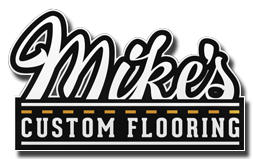When choosing hardwood flooring for your home, one of the most important decisions you’ll make is whether to go with solid hardwood or engineered hardwood. While both offer the timeless look and feel of real wood, they differ significantly in construction, performance, and suitability for certain environments. Understanding these differences can help you choose the right option for your lifestyle, climate, and budget. With this in mind, we at Mikes Custom Flooring would like to share the differences between solid hardwood and engineered hardwood flooring.
Hardwood Floor Construction
The primary difference between solid and engineered hardwood lies in how they’re made. Solid hardwood is crafted from a single, solid piece of wood, typically ¾-inch thick. This type of flooring can be sanded and refinished multiple times over its lifespan, making it a durable and long-lasting choice.
Engineered hardwood, on the other hand, is made of several layers. The top layer is a thin slice of real hardwood, while the underlying layers are typically made from plywood or high-density fiberboard. These layers are bonded together in a cross-grain configuration, which gives engineered wood enhanced stability.
Moisture Resistance
One of the biggest advantages of engineered hardwood is its resistance to moisture and humidity. The multi-layer construction makes it less prone to expanding or contracting with changes in temperature and humidity. This makes engineered hardwood ideal for basements, bathrooms, kitchens, and homes in humid climates. In contrast, solid hardwood is more susceptible to moisture damage and may warp or swell if exposed to excessive humidity or water. It is best suited for above-grade installations in areas with more stable environmental conditions.
Wood Floor Installation Options
Engineered hardwood is more versatile when it comes to installation. It can be installed over concrete subfloors, radiant heating systems, or even existing flooring, and it allows for multiple methods of installation—such as glue-down, staple, or floating. Solid hardwood typically requires a wood subfloor and must be nailed or stapled down. Installation can be more labor-intensive and costly, but the result is a classic, sturdy floor that many homeowners prefer for its authenticity.
Hardwood Flooring Longevity & Maintenance
Solid hardwood can last for decades, sometimes over a century, especially if properly maintained and periodically refinished. You can sand and refinish it multiple times to remove scratches and refresh its appearance. Engineered hardwood generally has a shorter refinishing lifespan. Depending on the thickness of the top wood veneer, it can only be sanded once or twice before the inner layers become exposed. However, high-quality engineered products can still offer 20–30 years of durability.
Price and Value of Hardwood Floors
In most cases, engineered hardwood is more affordable than solid hardwood. The cost savings come not only from the materials themselves but also from the reduced labor and installation time. However, solid hardwood often adds more value to a home in the long run due to its longevity and ability to be repeatedly refinished.
Hardwood Floor Installation, Repairs, Refinishing & More in Charles Town & Eastern Panhandle of Berkeley & Jefferson Counties in WV | Winchester & Frederick County | Round Hill & Loudoun County | Berryville & Clarke County | Herndon & Fairfax County VA
Both solid and engineered hardwood offer beauty, warmth, and natural charm. Your decision should be based on your home’s environment, your budget, and your long-term flooring goals. Whether you’re renovating one room or your entire home, understanding these differences ensures you make an investment that looks great and lasts for years to come. Call Mikes Custom Flooring for wood flooring services.





